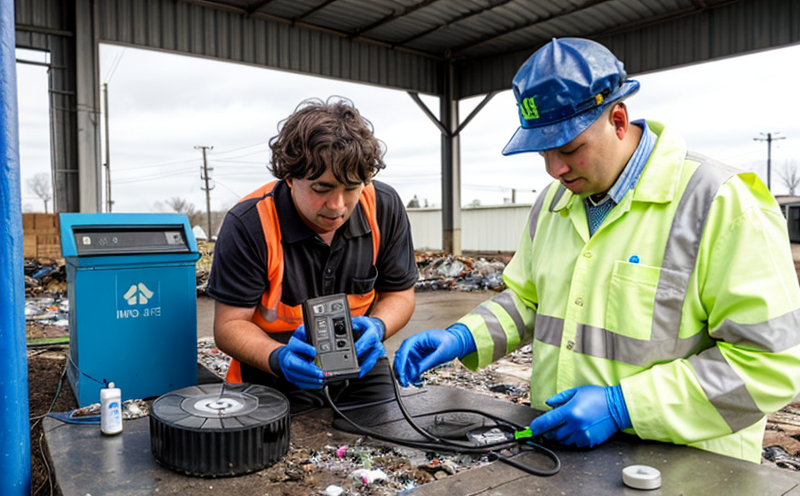ISO 24348 Lithium-Ion Battery Waste Safety Requirements
The ISO 24348 standard is a critical framework designed to ensure that lithium-ion (Li-ion) batteries are safely managed throughout their lifecycle, from production and distribution to recycling and final disposal. This standard focuses on the environmental safety requirements for Li-ion battery waste, aiming to protect human health and the environment from potential hazards associated with improper handling.
Lithium-ion batteries power a wide array of electronic devices, including smartphones, laptops, electric vehicles (EVs), and renewable energy storage systems. As their usage expands globally, so does the volume of Li-ion battery waste generated. Proper disposal is essential to prevent environmental contamination and ensure safe recycling processes. The ISO 24348 standard provides a set of guidelines that help manufacturers, recyclers, and regulatory bodies understand how to handle this type of waste safely.
The standard covers several key aspects related to Li-ion battery waste management:
- Identification of hazardous materials within the batteries
- Handling and transport requirements for waste batteries
- Safe storage practices during transportation and at recycling facilities
- Recycling methods that minimize environmental impact
- Testing protocols to ensure compliance with safety standards before disposal
- Proper labeling of waste materials for accurate identification and management
The implementation of ISO 24348 helps organizations meet regulatory requirements, reduce operational risks, and contribute positively to global sustainability goals. By adhering to these guidelines, companies can ensure that their processes are both compliant with international standards and environmentally responsible.
One notable feature of this standard is its emphasis on lifecycle management, which includes not only the end-of-life phase but also design and manufacturing stages. This holistic approach ensures that all parties involved in handling Li-ion batteries understand the importance of sustainability from the outset. Additionally, it promotes best practices for managing waste at various points along the supply chain, ensuring consistency across different industries.
In conclusion, ISO 24348 plays a pivotal role in promoting responsible management of lithium-ion battery waste by providing clear guidelines on how to handle and dispose of this material safely. Its comprehensive approach ensures that both industry stakeholders and regulatory bodies have the tools necessary to protect public health and the environment effectively.
Eurolab Advantages
At Eurolab, we are committed to providing world-class testing services tailored specifically for your organization's needs. Our expertise in ISO 24348 Lithium-Ion Battery Waste Safety Requirements allows us to offer unmatched quality and reliability when it comes to assessing compliance with this standard.
Our team of certified professionals uses state-of-the-art equipment and follows stringent procedures to ensure accurate results every time. Whether you need assistance with initial assessments, ongoing monitoring, or troubleshooting issues related to battery waste management, we have the resources and experience needed to support you successfully.
- Comprehensive testing capabilities for all aspects of ISO 24348 compliance
- Experienced staff trained in best practices for handling Li-ion battery waste safely
- Use of advanced analytical techniques to detect hazardous materials accurately
- Access to large databases containing relevant data and information about current regulations
- Customized solutions designed specifically around your unique business requirements
- Regular updates on any changes or additions to the ISO 24348 standard
- A commitment to confidentiality regarding all client information provided during testing
- Competitive pricing without compromising on quality or service level
With Eurolab by your side, you can rest assured that you are receiving top-tier support for all your ISO 24348 Lithium-Ion Battery Waste Safety Requirements needs. Our goal is to help you achieve compliance efficiently while minimizing disruptions to your operations.
Why Choose This Test
The decision to undergo testing according to the ISO 24348 standard offers numerous benefits for organizations involved in managing lithium-ion battery waste. By choosing Eurolab, you gain access to expert guidance and cutting-edge technology that will enable you to:
- Ensure strict adherence to international standards
- Demonstrate commitment to environmental stewardship
- Reduce risks associated with improper handling of hazardous materials
- Maintain a strong reputation among customers, suppliers, and regulatory bodies
- Stay ahead of evolving legislation and industry trends
- Minimize costs related to fines or penalties for non-compliance
- Enhance internal processes through continuous improvement initiatives
- Create safer working environments for employees handling Li-ion battery waste
In today's competitive landscape, demonstrating a proactive approach towards sustainability is increasingly important. Adopting the ISO 24348 standard shows that your organization values responsible practices and prioritizes protecting both human health and the environment.
Moreover, complying with this standard can lead to increased confidence from stakeholders such as investors, customers, and partners who appreciate companies taking steps towards reducing their carbon footprint. Ultimately, choosing Eurolab for ISO 24348 Lithium-Ion Battery Waste Safety Requirements testing ensures that you are making informed decisions based on sound scientific evidence.
Environmental and Sustainability Contributions
The implementation of the ISO 24348 standard contributes significantly to environmental protection and sustainability efforts worldwide. By promoting safe management practices for lithium-ion battery waste, this standard helps reduce pollution caused by improper disposal methods, which can harm ecosystems and affect wildlife.
- Prevents contamination of soil and water resources
- Makes recycling more efficient and cost-effective
- Saves natural resources by recovering valuable materials from old batteries
- Reduces greenhouse gas emissions through optimized recycling processes
- Promotes circular economy principles by extending product lifecycles
- Encourages innovation in developing greener alternatives for battery technology
- Supports local economies via job creation in the recycling sector
- Fosters global collaboration on best practices for handling hazardous materials safely
Furthermore, adhering to ISO 24348 not only benefits the environment but also enhances corporate social responsibility (CSR) initiatives. Many companies are incorporating environmental sustainability into their strategic plans, and complying with this standard aligns perfectly with those goals.
In summary, adopting the ISO 24348 standard is an effective way to contribute positively to environmental conservation while simultaneously strengthening your organization's reputation as a responsible corporate citizen.





